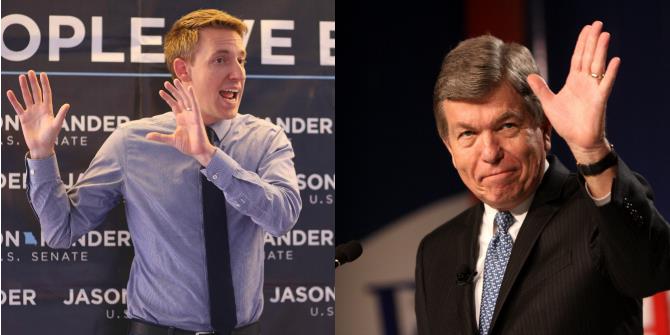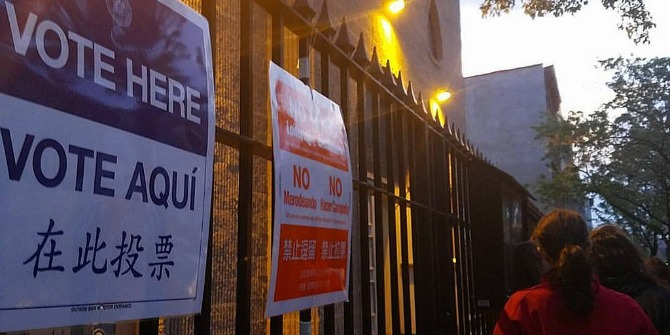 On Tuesday night, Michigan held its primary vote for the 2016 presidential election. While on the Republican side, Donald Trump was widely expected to win the most delegates – and he did – for the Democrats, Vermont Senator Bernie Sanders confounded all expectations and polling to beat former Secretary of State Hillary Clinton. Jenny Tatsak writes that the focus on the Michigan primary has been heightened because of recent media attention on the ongoing water crisis in Flint and on Detroit’s slow recovery after decades of decline. She argues that with their Michigan wins, both Trump and Sanders have shown that in this year’s election, many voters have a large appetite for an alternative to the political establishment.
On Tuesday night, Michigan held its primary vote for the 2016 presidential election. While on the Republican side, Donald Trump was widely expected to win the most delegates – and he did – for the Democrats, Vermont Senator Bernie Sanders confounded all expectations and polling to beat former Secretary of State Hillary Clinton. Jenny Tatsak writes that the focus on the Michigan primary has been heightened because of recent media attention on the ongoing water crisis in Flint and on Detroit’s slow recovery after decades of decline. She argues that with their Michigan wins, both Trump and Sanders have shown that in this year’s election, many voters have a large appetite for an alternative to the political establishment.
On Tuesday, voters in the Great Lakes State cast their ballots in the state’s presidential primary. With the most delegates at stake of the states voting this week, 147 Democratic and 59 Republican, Michigan was also the first race in the industrial Midwest. Defying all predictions, Vermont Senator Bernie Sanders edged out former Secretary of State Hillary Clinton to win the Democratic primary. Donald Trump handily won the state’s Republican contest.
A Tale of Two Cities
The Michigan primary was closely watched as an indicator of future trends and general election strengths and weaknesses. The importance of the race was heightened because of Michigan’s nonstop media attention in recent years. Until 2015, Detroit was known as the “murder capital” exceeding all other cities in the number of criminal homicides. Former Detroit Mayor Kwame Kilpatrick is currently serving a 28 year sentence in federal prison for mail fraud, wire tapping, and racketeering. Hard hit by the 2008 recession, the odds seemed stacked against Detroit to recover from the corruption, bankruptcy and subsequent emergency management, wide-spread blight, high drug crimes, and long history of racial unrest. Through significant and unprecedented investments from mortgage lenders, banking, sporting franchises and the auto industry, Detroit is emerging with a vibrant and growing downtown area to spur the recovery few thought was possible.
While Detroit is a city on the rise, Flint is a Michigan city experiencing a catastrophic decline. An international media spotlight is focused on the Flint water crisis. Amid claims of environmental racism, Michigan’s Republican Governor, Rick Snyder has been widely blamed for rerouting the water supply, of this predominantly African American community with many living below the poverty line, causing the contamination of the city’s water.
The tempestuous political climate of Detroit and Flint, coupled with its position as the first Midwest primary, made Michigan the March 8 race to watch, and it delivered with record turnout for anti-establishment candidates. While Donald Trump was the predicted favorite, Bernie Sanders earned a win few thought was possible in Michigan.
What is Michigan Telling Us?
Donald Trump touts his political inexperience as an asset. He is unlike any other candidate; he holds victory press conferences instead of campaign rallies. At these victory press conferences, guests can be photographed on a “step and repeat” popularized by celebrities at events and award ceremonies like the Academy Awards. In response to criticism from Michigan native and former Republican 2012 presidential candidate, Mitt Romney, Trump wine, steak, and water were on display and discussed in his televised remarks. His campaign promise to build wall, funded by Mexico, to stop illegal immigration is perhaps the most recognized example of his political out-of-the-box thinking, these most recent examples of Trump’s campaign rhetoric further set him apart from the competition on both sides of the aisle.
Despite 26 years in elected offices, Sanders is considered a political outsider. As the longest-serving independent member of Congress, self-described “Democratic Socialist,” Sanders describes his campaign as a “political revolution.” His populist platform includes free tuition at public colleges and universities, higher minimum wage, and tax reform aimed at corporations and the wealthy. During the televised debate, Sanders characterized Secretary Clinton as a political insider responsible for sending Michigan’s manufacturing jobs overseas because of policies like the North American Free Trade Agreement. Sanders’ tousled appearance and off-the-cuff, sometimes argumentative, communication style is unlike the overly-coiffured and teleprompter-savvy politicians we have come to expect in political campaigns.
In this election cycle, marked by surprises, Michigan is no different. The presumptive Democratic favorite, Hillary Clinton, lost despite polls predicting a double digit victory. Donald Trump, despite recommending the Big Three automakers move operations to lower-wage states, won against opponents with less controversial manufacturing stances. Michigan, home of the extremes of the rise of Detroit and the setback of Flint, voted for the political outsider suggesting Michiganders want something different from the political establishment.
Featured image credit: Todd L. Church (Flickr, CC-BY-2.0)
Please read our comments policy before commenting.
Note: This article gives the views of the author, and not the position of USAPP– American Politics and Policy, nor of the London School of Economics, or Walsh College.
Shortened URL for this post: http://bit.ly/222P9bc
_________________________________
 Jenny Tatsak – Walsh College
Jenny Tatsak – Walsh College
Jenny Tatsak is a Professor of Business Communication at Walsh College. Her fields of interest include persuasive campaigns and strategic communication. She worked in a number of capacities on political statewide, regional, and national campaigns, including campaign manager and primary spokesperson.






